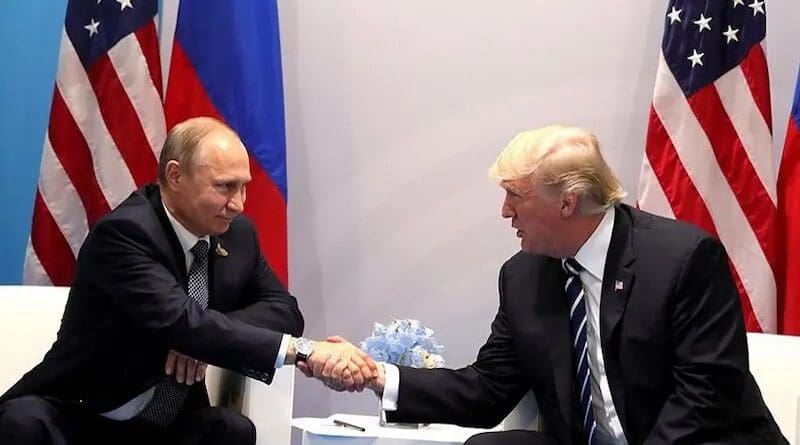July’s Russia Related Bloopers And Putin’s Manner – Analysis
An event like the initial Donald Trump-Vladimir Putin meeting encourages more discussion about the beast in the east. On this matter, some requests have asked for a formal presentation of my informal observations.
Ralph Peters’ predictable spin is discussed in my last Strategic Culture Foundation (SCF) article of July 17. Two others stand out, along with some recent statesmanlike conduct from Putin.
David Ignatius’ July 7 Washington Post piece has this thought:
“Trump may claim a ‘win,’ but the greater beneficiary is probably Putin, who seized this opportunity to ‘come in from the cold’ after the sanctions and diplomatic isolation that followed Russia’s 2014 invasion of Crimea.”
There’s a certain sense of irony when the neocons and neolibs suggest that Trump is living in a bubble. Since 2014, Putin has had many high level meetings among the international community. These talks have included the leaders of France, Germany, Turkey, China and Japan. If anything, Russia’s position on Syria (to defeat terrorism first over regime change in that country) seems to have gained ground (particularly in France). Simply put, Putin/Russia hasn’t been isolated. Upon a further objective overview, there’s no legitimate basis for Russia to be isolated.
Louis Proyect’s July 7 Counterpunch article on Poland’s past with Russia came shortly after Trump’s visit to Poland. Concerning Russian-Polish history, Proyect engages in a historical cherry picking. He writes:
“The relation of Poland to Russia was analogous to that of Ireland to Great Britain, Quebec to English Canada, the Haudenosaunee (Iroquois) to the United States. The Polish people were an oppressed nation within the prison-house of nations that had been Tsarist Russia.”
The Irish have never really been in a position to dominate and oppress Britain. The same can’t be said of Poland relative to Russia. Poland’s 17th century attack and subjugation of Russia was certainly not benevolent. There’s also the issue of the 90,000 plus Poles who joined Napoleon in his attack on Russia in 1812. Josef Pilsudski’s double dealing during the Russian Civil War came back to bite Poland. (This imperial, Machiavellian, anti-Russian attempt on his part is detailed in my April 7, 2016 SCF article, rerun the following day in Eurasia Review.)
Proyect’s anti-Jewish tag on the Russians is disproportionate. Poles have had their share of anti-Jewish sentiment. Among other instances, this is noted in the docudrama “Europa Europa“, centering around a WW II era German Jew who experiences Nazi, Polish and Soviet rule. In this movie, the mostly Russian comprised Soviets come out looking the least anti-Jewish of the three aforementioned groups.
Proyect’s reference to the Katyn massacre of Poles by the Soviets leads to a comparison with an earlier instance which gets little notice in the West. Shortly after WW I, the Polish-Soviet War, saw thousands of Red Army prisoners die under dreadful conditions in Polish captivity. The adage about two wrongs not making a right, shouldn’t excuse hypocrisy.
Katyn was a calculated mass killing. The situation with the mass deaths under Polish captivity have been attributed to unintended poor sanitary conditions which involved a lack of adequate housing. I’m not sure that explanation fully explains away any culpability for these deaths.
The recent diagnosis of Arizona Senator John McCain having a severe form of brain cancer has seen two extremes of coverage. At this time of great challenge for him, US mass media has uncritically lauded him as a hero. In contrast, some alternative sources have been in a rather gleeful mood over his ailment.
For quite some time, McCain has said some inaccurately unkind things about Russia and Putin. In his series of interviews with Oliver Stone, the Russian president seemed to shock Stone a bit, with a measured appraisal of McCain. Putin said he admired McCain’s patriotism, while disagreeing with the Arizona senator’s faulty way of looking at some things. On this particular, the Russian leader elaborated by likening McCain to the Roman senator, who frequently stated that “Carthage must be destroyed.”
Last week, Putin took the time to meet the Russian human rights activist Lyudmila Alexeyeva in honor of her 90th birthday. At this meeting, Putin gave a positive reference to Aleksandr Solzhenitsyn
Michael Averko is a New York based foreign policy analyst and media critic.

